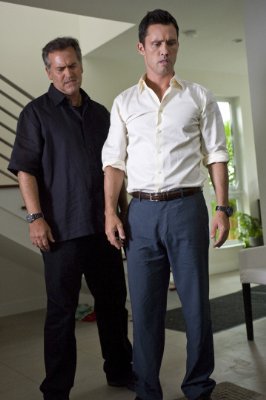 I apologize again or my absence the past couple of episodes. But this was a pretty good one to come back to.
I apologize again or my absence the past couple of episodes. But this was a pretty good one to come back to.
Michael’s existence has changed a lot over the past two and a half years. From a closed-off and guarded loner, he’s learned to trust and care about other people in ways that had long been submerged. He’s still broken. But who isn’t? His sexy flirtation with Fiona in the pilot wasn’t about compassion or concern: it was about the raw physical passion between these two lovers. His early interactions with Sam were awkward, even after Sam’s deal with the Feds was in the open. And let’s not forget his idiot brother and insane mother, right?
Except that’s not who those people are. Madeline loves her son, Sam is a loyal friend, Nate really does try, and Fi…well Fi wants Michael’s heart and soul. Have they all changed or is it that as Michael has changed, his perceptions of those around him – and the reflected perceptions we see – have changed? I’d argue for the latter.
I’m not implying this is the authorial intent. These relationships really have matured over time, as a function of the writing and the performances. But try looking at the show as if it is truly and completely Michael’s journey and we are merely passengers seeing the world unfold before his eyes. In that case, we should expect the world he sees/we see to change in ways both small and large. Miami might appear larger and less restrictive. Madeline more nuanced and human. Sam more loyal.
In The Last Temptation of Christ, when Lucifer shows Jesus the world he could have if he faltered – a long, happy life in a verdant world – he tells Jesus that Israel has always been a garden and he had failed to see it as such. On one hand, this is Lucifer’s attempt to tempt Christ, so we know he’s pumping up the saturation of the colors a bit. On the other, we know that Israel is a land of desert and of forest and of gardens and of beaches. Throughout the rest of the film, Scorsese shows us only the desert aspect. Even at the final Seder, in the GARDEN of Gethsemane, the land is dusty and sere. Our perception of the world is intentionally Jesus’ perception.
I suggest looking at Burn Notice in the same vein. See Miami as though we see it through Michael’s eyes. See his friends and family the same way. He is changing.
Which makes his deal with Strickler that much worse.
Strickler is the devil here. The more he can pull Michael into his world, the farther Michael will be from the humanizing influences of Sam and Fi and Madeline and Nate and even Barry. He’ll shut them out and close himself off and do bad things without questioning why. He’ll do whatever it takes to get back in from the cold, including turning himself back into a closed-off and guarded loner.
Nothing hurts worse than losing a friend to bullets, politics, or something personal. But when you have to work alone again, you lock those feelings away and do the job at hand. Because as every spy knows, there’s plenty of time to think about what you’ve lost after the mission is over.
That compartmentalization is fine to a point but is emotionally crippling if taken to an extreme.
I think episode scribe Rashad Raisani might have pushed the “Natalie is a victim; Milovan is evil” line a bit too hard as it was pretty clear before the reveal that she was the evil mastermind. Then again, once you’ve cast Callie Thorne, I just assume her character is either evil or crazy. She plays such deliciously evil women. Other than that – and a truly obnoxious product placement for a beer I wouldn’t use to put out a fire in my pants – I was thoroughly engaged tonight.
The humor, used in lighter doses than usual, worked well to punctuate the higher emotional stakes. If you want a good gauge of how light the humor was tonight: Barry was the client and had a decent amount of screen time. He wasn’t used for laughs.
Chin Bits
- “I just didn’t expect to be wearing pants here.”
- “Oh, that Marmaduke. He will never learn.”
- And one of the best fake outs I’ve ever seen them pull on Burn Notice: Sam letting Milovan think he’d gotten under his skin (maybe he did, a little) and get his gun. There are two ways of looking at the scene: Sam really got riled and screwed up but is competent enough not to keep his accessible piece armed, or Sam wanted Milovan to think he was going to be free so he would see he’d underestimated his captors. I’m leaning – about 52-48 – to the latter interpretation.
Important Lessons in Spycraft
- “An operation’s more likely to be saved by a fresh set of batteries than a gun.”
- “Tidying up after a heist often involves methods not suitable for parties.”
- “Anyone trained in counter-surveillance knows most field ops are between 22 – when people finish training – and 55, when they retire. Which is why even wary operatives don’t pay any attention to kids or people on social security.”
- “Burn safes depend on an internal ignition device to start a fire. Pump in liquid CO2 and, if you do it right, you can turn that ignition device into a popsicle. Do it wrong, you turn everything inside the safe to a pile of ash.”
- “Spies don’t keep a lot of prisoners. When you hold someone, you only learn what they tell you. Let them go and you can learn what they do and where they go.”
What did everyone else think?